BTEC Higher National Certificate Unit 7 Business Law Report
VerifiedAdded on 2022/09/23
|21
|7000
|24
Report
AI Summary
This report provides a comprehensive overview of business law, focusing on the legal system, sources of law, and the role of government in law-making within the United Kingdom. It explores statutory and common law, evaluating the effectiveness of the legal system through recent reforms. The report delves into the potential impact of company, employment, and contract law on businesses, differentiating between legislation, regulations, and standards. It examines the legal formation, management, and funding of various business organizations, assessing their advantages and disadvantages. Furthermore, the report recommends legal solutions for resolving disputes, comparing and contrasting different sources of legal advice and support. The report provides a detailed analysis of the legal landscape and its implications for businesses.

ASSIGNM
ENT
BRIEF
BTEC
Higher
National
Certificat
e in
Business
Centre
Code:
01018
GEO
RGI
SAB
EV
CCL-
21-
327
UNI
T 7:
BUS
INE
SS
LA
W
ENT
BRIEF
BTEC
Higher
National
Certificat
e in
Business
Centre
Code:
01018
GEO
RGI
SAB
EV
CCL-
21-
327
UNI
T 7:
BUS
INE
SS
LA
W
Paraphrase This Document
Need a fresh take? Get an instant paraphrase of this document with our AI Paraphraser
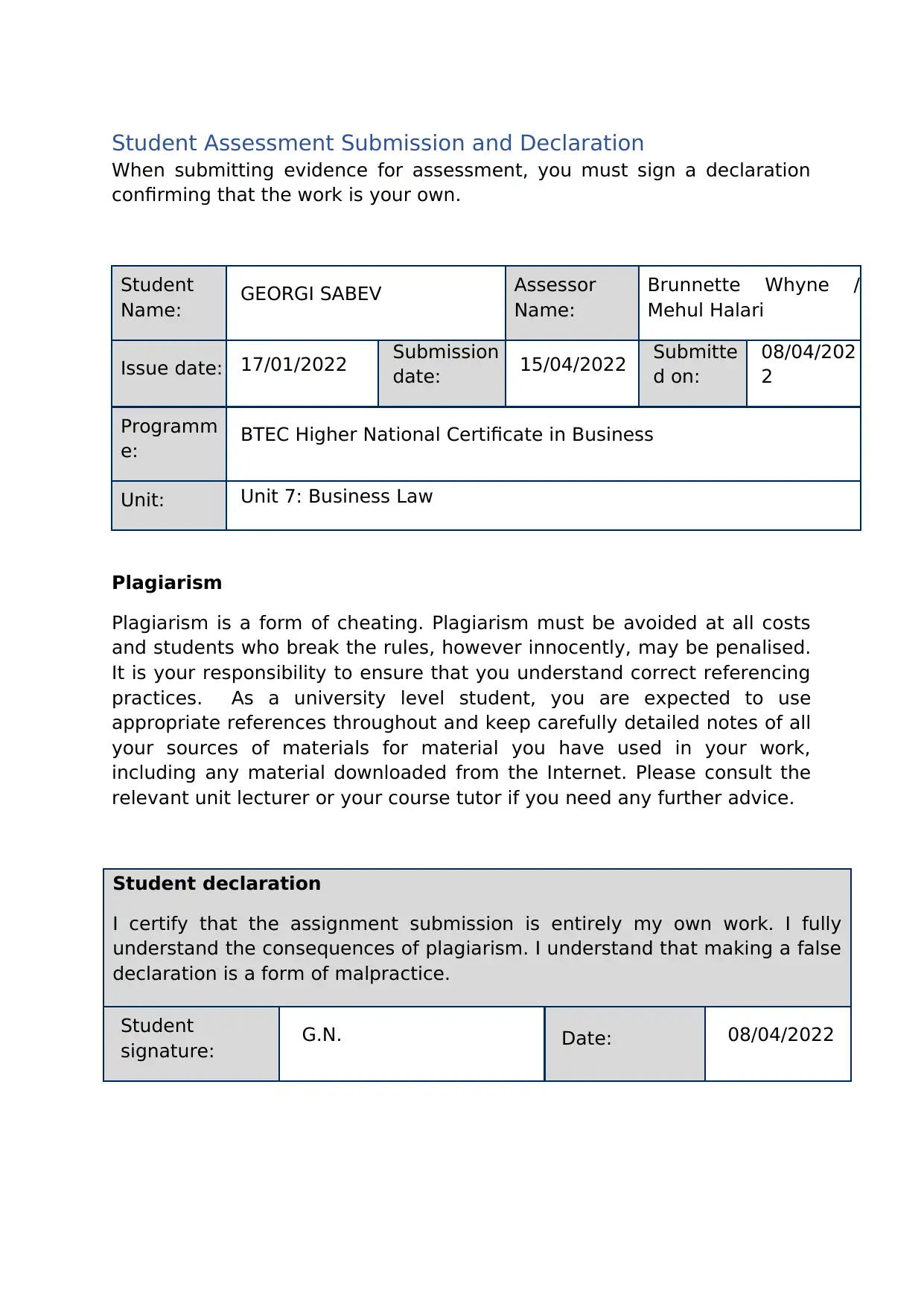
Student Assessment Submission and Declaration
When submitting evidence for assessment, you must sign a declaration
confirming that the work is your own.
Student
Name: GEORGI SABEV Assessor
Name:
Brunnette Whyne /
Mehul Halari
Issue date: 17/01/2022 Submission
date: 15/04/2022 Submitte
d on:
08/04/202
2
Programm
e: BTEC Higher National Certificate in Business
Unit: Unit 7: Business Law
Plagiarism
Plagiarism is a form of cheating. Plagiarism must be avoided at all costs
and students who break the rules, however innocently, may be penalised.
It is your responsibility to ensure that you understand correct referencing
practices. As a university level student, you are expected to use
appropriate references throughout and keep carefully detailed notes of all
your sources of materials for material you have used in your work,
including any material downloaded from the Internet. Please consult the
relevant unit lecturer or your course tutor if you need any further advice.
Student declaration
I certify that the assignment submission is entirely my own work. I fully
understand the consequences of plagiarism. I understand that making a false
declaration is a form of malpractice.
Student
signature: G.N. Date: 08/04/2022
When submitting evidence for assessment, you must sign a declaration
confirming that the work is your own.
Student
Name: GEORGI SABEV Assessor
Name:
Brunnette Whyne /
Mehul Halari
Issue date: 17/01/2022 Submission
date: 15/04/2022 Submitte
d on:
08/04/202
2
Programm
e: BTEC Higher National Certificate in Business
Unit: Unit 7: Business Law
Plagiarism
Plagiarism is a form of cheating. Plagiarism must be avoided at all costs
and students who break the rules, however innocently, may be penalised.
It is your responsibility to ensure that you understand correct referencing
practices. As a university level student, you are expected to use
appropriate references throughout and keep carefully detailed notes of all
your sources of materials for material you have used in your work,
including any material downloaded from the Internet. Please consult the
relevant unit lecturer or your course tutor if you need any further advice.
Student declaration
I certify that the assignment submission is entirely my own work. I fully
understand the consequences of plagiarism. I understand that making a false
declaration is a form of malpractice.
Student
signature: G.N. Date: 08/04/2022
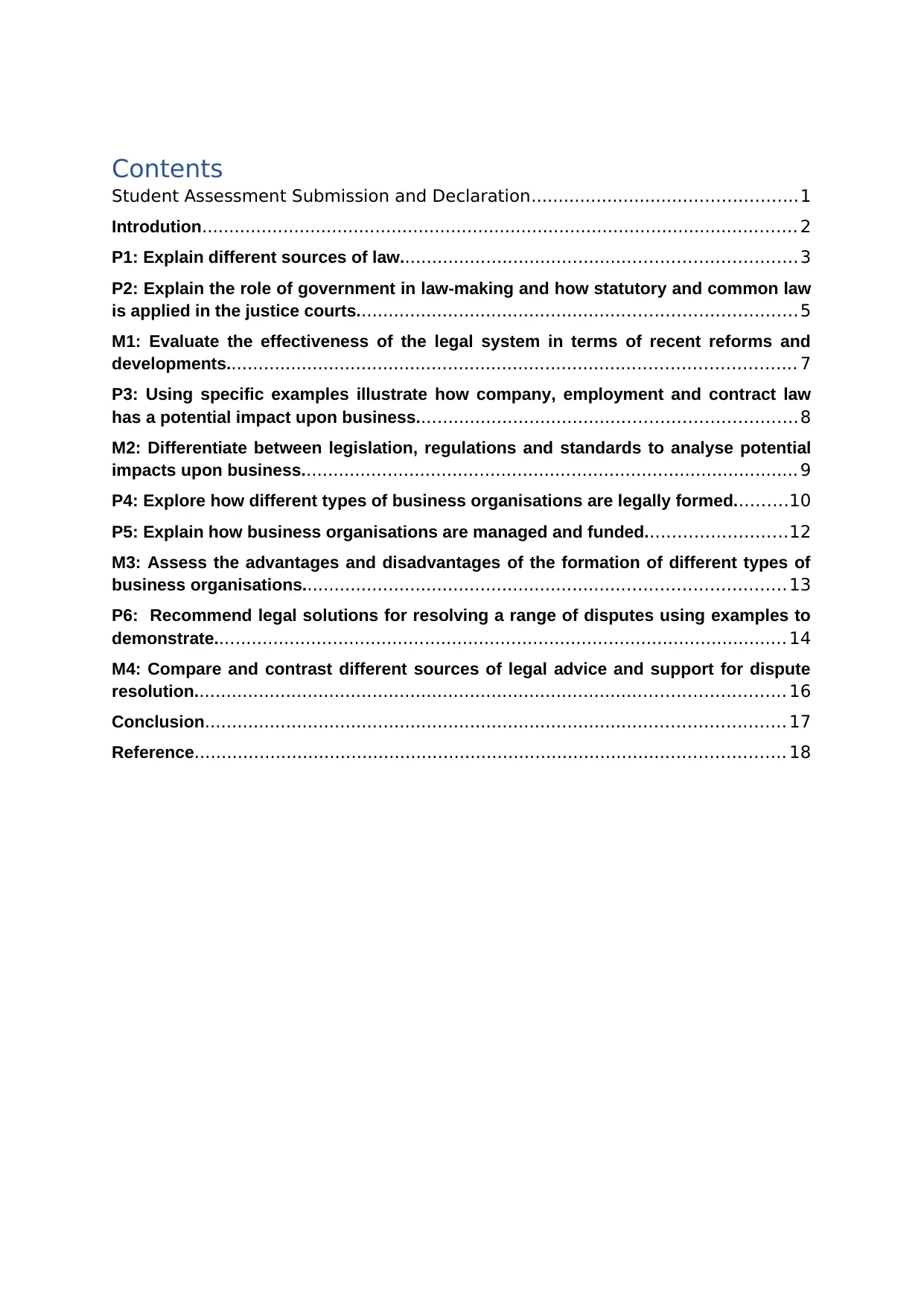
Contents
Student Assessment Submission and Declaration.................................................1
Introdution.............................................................................................................. 2
P1: Explain different sources of law.........................................................................3
P2: Explain the role of government in law-making and how statutory and common law
is applied in the justice courts.................................................................................5
M1: Evaluate the effectiveness of the legal system in terms of recent reforms and
developments......................................................................................................... 7
P3: Using specific examples illustrate how company, employment and contract law
has a potential impact upon business......................................................................8
M2: Differentiate between legislation, regulations and standards to analyse potential
impacts upon business............................................................................................ 9
P4: Explore how different types of business organisations are legally formed..........10
P5: Explain how business organisations are managed and funded..........................12
M3: Assess the advantages and disadvantages of the formation of different types of
business organisations......................................................................................... 13
P6: Recommend legal solutions for resolving a range of disputes using examples to
demonstrate.......................................................................................................... 14
M4: Compare and contrast different sources of legal advice and support for dispute
resolution............................................................................................................. 16
Conclusion........................................................................................................... 17
Reference............................................................................................................. 18
Student Assessment Submission and Declaration.................................................1
Introdution.............................................................................................................. 2
P1: Explain different sources of law.........................................................................3
P2: Explain the role of government in law-making and how statutory and common law
is applied in the justice courts.................................................................................5
M1: Evaluate the effectiveness of the legal system in terms of recent reforms and
developments......................................................................................................... 7
P3: Using specific examples illustrate how company, employment and contract law
has a potential impact upon business......................................................................8
M2: Differentiate between legislation, regulations and standards to analyse potential
impacts upon business............................................................................................ 9
P4: Explore how different types of business organisations are legally formed..........10
P5: Explain how business organisations are managed and funded..........................12
M3: Assess the advantages and disadvantages of the formation of different types of
business organisations......................................................................................... 13
P6: Recommend legal solutions for resolving a range of disputes using examples to
demonstrate.......................................................................................................... 14
M4: Compare and contrast different sources of legal advice and support for dispute
resolution............................................................................................................. 16
Conclusion........................................................................................................... 17
Reference............................................................................................................. 18
⊘ This is a preview!⊘
Do you want full access?
Subscribe today to unlock all pages.

Trusted by 1+ million students worldwide
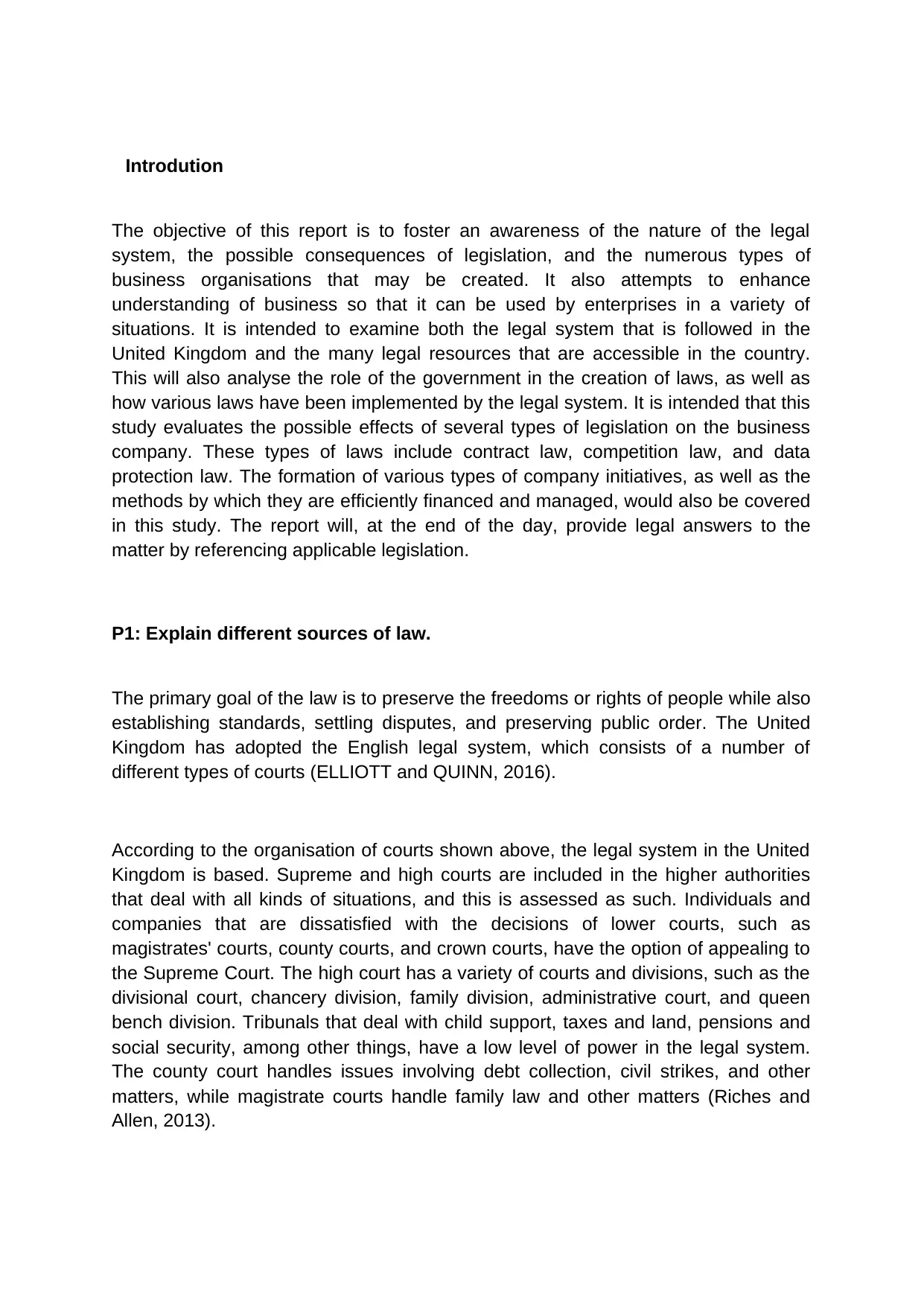
Introdution
The objective of this report is to foster an awareness of the nature of the legal
system, the possible consequences of legislation, and the numerous types of
business organisations that may be created. It also attempts to enhance
understanding of business so that it can be used by enterprises in a variety of
situations. It is intended to examine both the legal system that is followed in the
United Kingdom and the many legal resources that are accessible in the country.
This will also analyse the role of the government in the creation of laws, as well as
how various laws have been implemented by the legal system. It is intended that this
study evaluates the possible effects of several types of legislation on the business
company. These types of laws include contract law, competition law, and data
protection law. The formation of various types of company initiatives, as well as the
methods by which they are efficiently financed and managed, would also be covered
in this study. The report will, at the end of the day, provide legal answers to the
matter by referencing applicable legislation.
P1: Explain different sources of law.
The primary goal of the law is to preserve the freedoms or rights of people while also
establishing standards, settling disputes, and preserving public order. The United
Kingdom has adopted the English legal system, which consists of a number of
different types of courts (ELLIOTT and QUINN, 2016).
According to the organisation of courts shown above, the legal system in the United
Kingdom is based. Supreme and high courts are included in the higher authorities
that deal with all kinds of situations, and this is assessed as such. Individuals and
companies that are dissatisfied with the decisions of lower courts, such as
magistrates' courts, county courts, and crown courts, have the option of appealing to
the Supreme Court. The high court has a variety of courts and divisions, such as the
divisional court, chancery division, family division, administrative court, and queen
bench division. Tribunals that deal with child support, taxes and land, pensions and
social security, among other things, have a low level of power in the legal system.
The county court handles issues involving debt collection, civil strikes, and other
matters, while magistrate courts handle family law and other matters (Riches and
Allen, 2013).
The objective of this report is to foster an awareness of the nature of the legal
system, the possible consequences of legislation, and the numerous types of
business organisations that may be created. It also attempts to enhance
understanding of business so that it can be used by enterprises in a variety of
situations. It is intended to examine both the legal system that is followed in the
United Kingdom and the many legal resources that are accessible in the country.
This will also analyse the role of the government in the creation of laws, as well as
how various laws have been implemented by the legal system. It is intended that this
study evaluates the possible effects of several types of legislation on the business
company. These types of laws include contract law, competition law, and data
protection law. The formation of various types of company initiatives, as well as the
methods by which they are efficiently financed and managed, would also be covered
in this study. The report will, at the end of the day, provide legal answers to the
matter by referencing applicable legislation.
P1: Explain different sources of law.
The primary goal of the law is to preserve the freedoms or rights of people while also
establishing standards, settling disputes, and preserving public order. The United
Kingdom has adopted the English legal system, which consists of a number of
different types of courts (ELLIOTT and QUINN, 2016).
According to the organisation of courts shown above, the legal system in the United
Kingdom is based. Supreme and high courts are included in the higher authorities
that deal with all kinds of situations, and this is assessed as such. Individuals and
companies that are dissatisfied with the decisions of lower courts, such as
magistrates' courts, county courts, and crown courts, have the option of appealing to
the Supreme Court. The high court has a variety of courts and divisions, such as the
divisional court, chancery division, family division, administrative court, and queen
bench division. Tribunals that deal with child support, taxes and land, pensions and
social security, among other things, have a low level of power in the legal system.
The county court handles issues involving debt collection, civil strikes, and other
matters, while magistrate courts handle family law and other matters (Riches and
Allen, 2013).
Paraphrase This Document
Need a fresh take? Get an instant paraphrase of this document with our AI Paraphraser
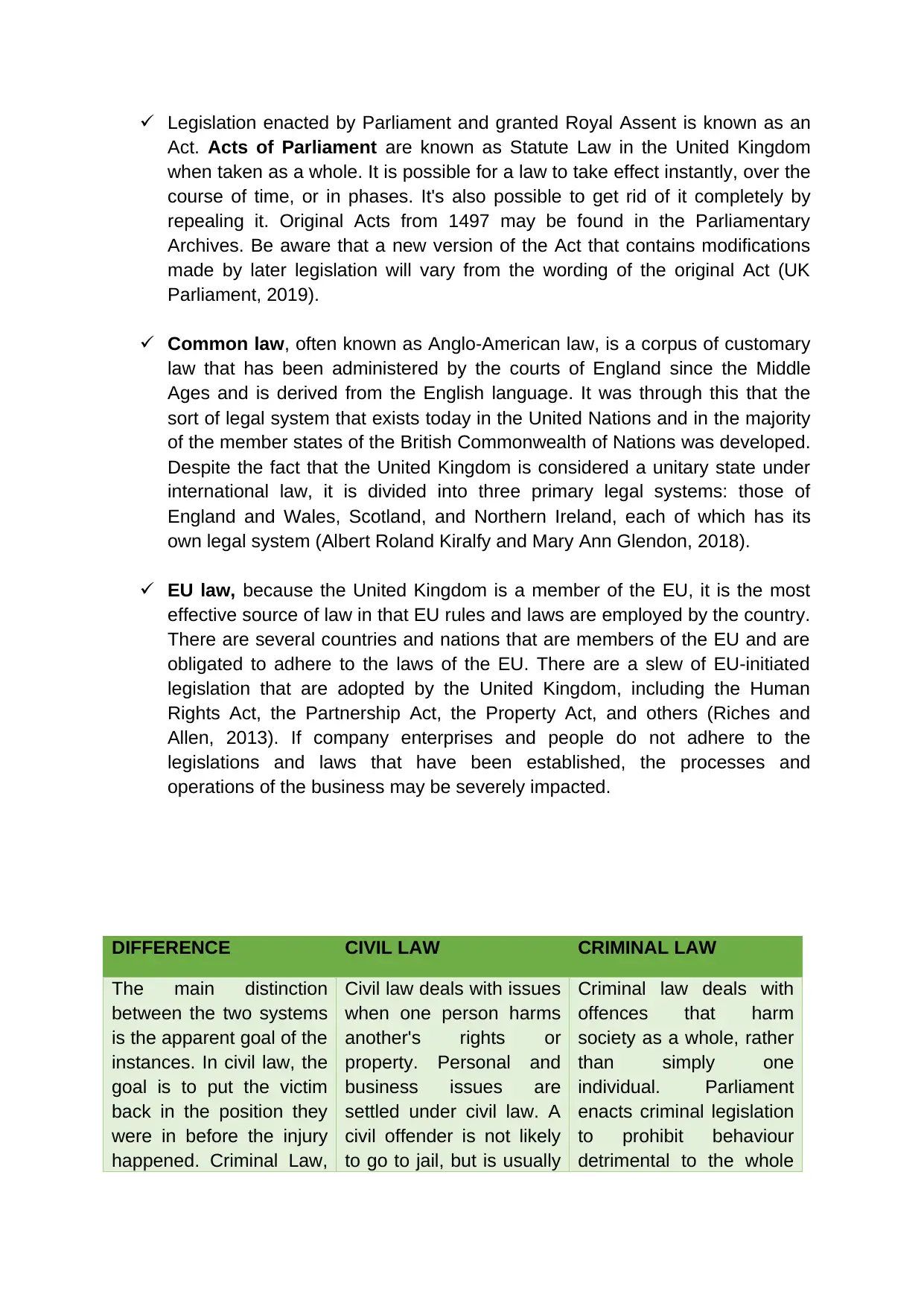
Legislation enacted by Parliament and granted Royal Assent is known as an
Act. Acts of Parliament are known as Statute Law in the United Kingdom
when taken as a whole. It is possible for a law to take effect instantly, over the
course of time, or in phases. It's also possible to get rid of it completely by
repealing it. Original Acts from 1497 may be found in the Parliamentary
Archives. Be aware that a new version of the Act that contains modifications
made by later legislation will vary from the wording of the original Act (UK
Parliament, 2019).
Common law, often known as Anglo-American law, is a corpus of customary
law that has been administered by the courts of England since the Middle
Ages and is derived from the English language. It was through this that the
sort of legal system that exists today in the United Nations and in the majority
of the member states of the British Commonwealth of Nations was developed.
Despite the fact that the United Kingdom is considered a unitary state under
international law, it is divided into three primary legal systems: those of
England and Wales, Scotland, and Northern Ireland, each of which has its
own legal system (Albert Roland Kiralfy and Mary Ann Glendon, 2018).
EU law, because the United Kingdom is a member of the EU, it is the most
effective source of law in that EU rules and laws are employed by the country.
There are several countries and nations that are members of the EU and are
obligated to adhere to the laws of the EU. There are a slew of EU-initiated
legislation that are adopted by the United Kingdom, including the Human
Rights Act, the Partnership Act, the Property Act, and others (Riches and
Allen, 2013). If company enterprises and people do not adhere to the
legislations and laws that have been established, the processes and
operations of the business may be severely impacted.
DIFFERENCE CIVIL LAW CRIMINAL LAW
The main distinction
between the two systems
is the apparent goal of the
instances. In civil law, the
goal is to put the victim
back in the position they
were in before the injury
happened. Criminal Law,
Civil law deals with issues
when one person harms
another's rights or
property. Personal and
business issues are
settled under civil law. A
civil offender is not likely
to go to jail, but is usually
Criminal law deals with
offences that harm
society as a whole, rather
than simply one
individual. Parliament
enacts criminal legislation
to prohibit behaviour
detrimental to the whole
Act. Acts of Parliament are known as Statute Law in the United Kingdom
when taken as a whole. It is possible for a law to take effect instantly, over the
course of time, or in phases. It's also possible to get rid of it completely by
repealing it. Original Acts from 1497 may be found in the Parliamentary
Archives. Be aware that a new version of the Act that contains modifications
made by later legislation will vary from the wording of the original Act (UK
Parliament, 2019).
Common law, often known as Anglo-American law, is a corpus of customary
law that has been administered by the courts of England since the Middle
Ages and is derived from the English language. It was through this that the
sort of legal system that exists today in the United Nations and in the majority
of the member states of the British Commonwealth of Nations was developed.
Despite the fact that the United Kingdom is considered a unitary state under
international law, it is divided into three primary legal systems: those of
England and Wales, Scotland, and Northern Ireland, each of which has its
own legal system (Albert Roland Kiralfy and Mary Ann Glendon, 2018).
EU law, because the United Kingdom is a member of the EU, it is the most
effective source of law in that EU rules and laws are employed by the country.
There are several countries and nations that are members of the EU and are
obligated to adhere to the laws of the EU. There are a slew of EU-initiated
legislation that are adopted by the United Kingdom, including the Human
Rights Act, the Partnership Act, the Property Act, and others (Riches and
Allen, 2013). If company enterprises and people do not adhere to the
legislations and laws that have been established, the processes and
operations of the business may be severely impacted.
DIFFERENCE CIVIL LAW CRIMINAL LAW
The main distinction
between the two systems
is the apparent goal of the
instances. In civil law, the
goal is to put the victim
back in the position they
were in before the injury
happened. Criminal Law,
Civil law deals with issues
when one person harms
another's rights or
property. Personal and
business issues are
settled under civil law. A
civil offender is not likely
to go to jail, but is usually
Criminal law deals with
offences that harm
society as a whole, rather
than simply one
individual. Parliament
enacts criminal legislation
to prohibit behaviour
detrimental to the whole
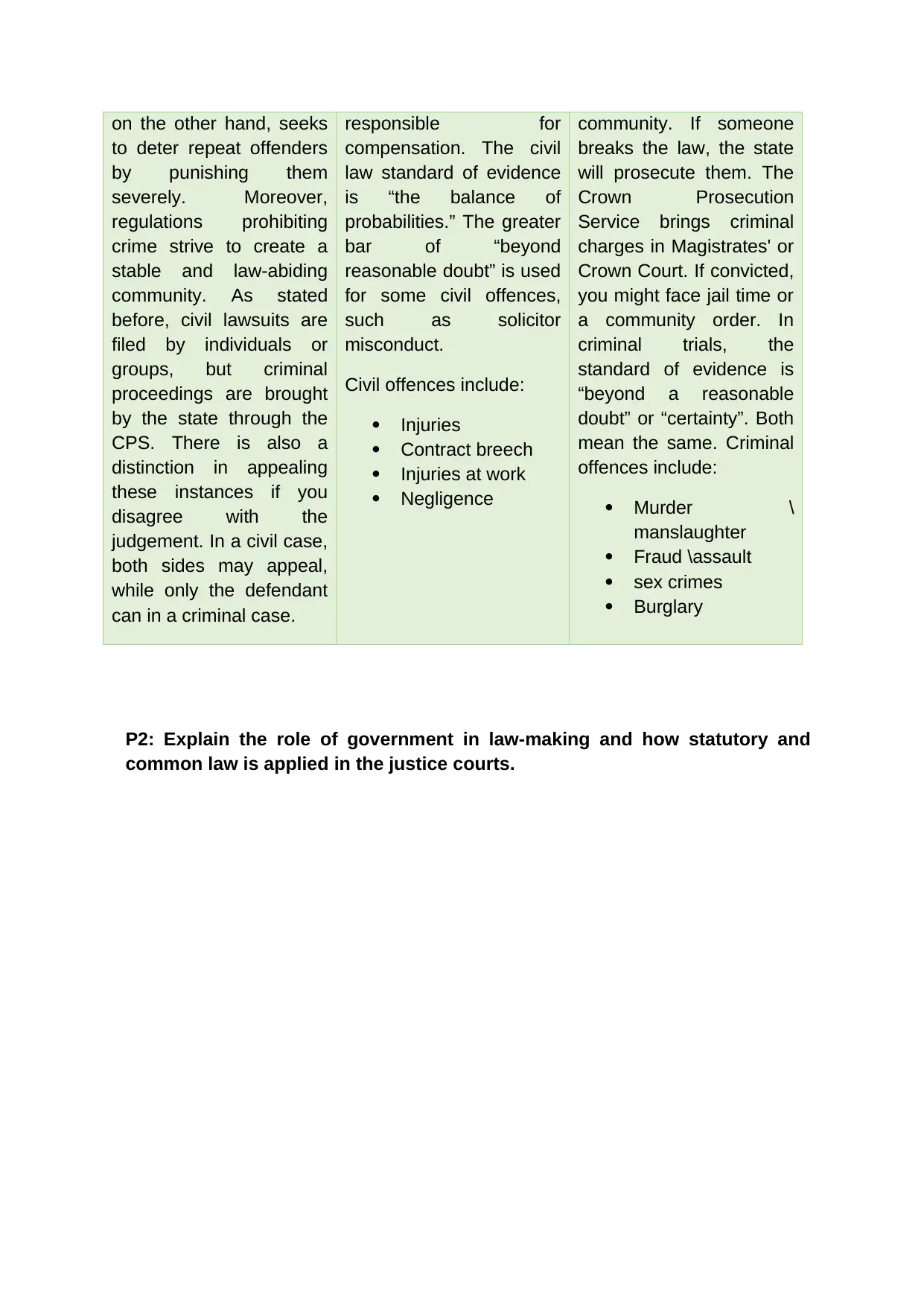
on the other hand, seeks
to deter repeat offenders
by punishing them
severely. Moreover,
regulations prohibiting
crime strive to create a
stable and law-abiding
community. As stated
before, civil lawsuits are
filed by individuals or
groups, but criminal
proceedings are brought
by the state through the
CPS. There is also a
distinction in appealing
these instances if you
disagree with the
judgement. In a civil case,
both sides may appeal,
while only the defendant
can in a criminal case.
responsible for
compensation. The civil
law standard of evidence
is “the balance of
probabilities.” The greater
bar of “beyond
reasonable doubt” is used
for some civil offences,
such as solicitor
misconduct.
Civil offences include:
Injuries
Contract breech
Injuries at work
Negligence
community. If someone
breaks the law, the state
will prosecute them. The
Crown Prosecution
Service brings criminal
charges in Magistrates' or
Crown Court. If convicted,
you might face jail time or
a community order. In
criminal trials, the
standard of evidence is
“beyond a reasonable
doubt” or “certainty”. Both
mean the same. Criminal
offences include:
Murder \
manslaughter
Fraud \assault
sex crimes
Burglary
P2: Explain the role of government in law-making and how statutory and
common law is applied in the justice courts.
to deter repeat offenders
by punishing them
severely. Moreover,
regulations prohibiting
crime strive to create a
stable and law-abiding
community. As stated
before, civil lawsuits are
filed by individuals or
groups, but criminal
proceedings are brought
by the state through the
CPS. There is also a
distinction in appealing
these instances if you
disagree with the
judgement. In a civil case,
both sides may appeal,
while only the defendant
can in a criminal case.
responsible for
compensation. The civil
law standard of evidence
is “the balance of
probabilities.” The greater
bar of “beyond
reasonable doubt” is used
for some civil offences,
such as solicitor
misconduct.
Civil offences include:
Injuries
Contract breech
Injuries at work
Negligence
community. If someone
breaks the law, the state
will prosecute them. The
Crown Prosecution
Service brings criminal
charges in Magistrates' or
Crown Court. If convicted,
you might face jail time or
a community order. In
criminal trials, the
standard of evidence is
“beyond a reasonable
doubt” or “certainty”. Both
mean the same. Criminal
offences include:
Murder \
manslaughter
Fraud \assault
sex crimes
Burglary
P2: Explain the role of government in law-making and how statutory and
common law is applied in the justice courts.
⊘ This is a preview!⊘
Do you want full access?
Subscribe today to unlock all pages.

Trusted by 1+ million students worldwide
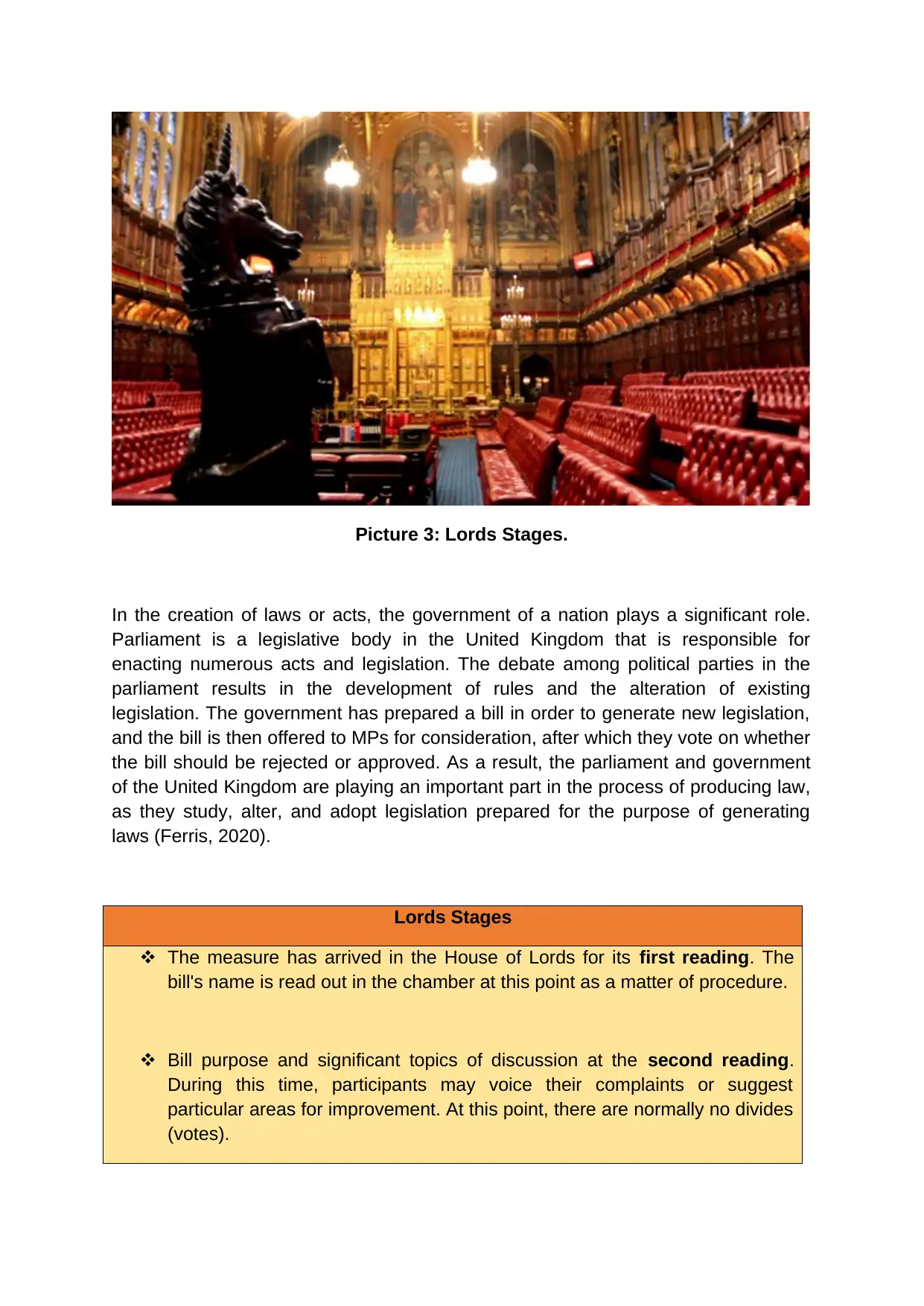
Picture 3: Lords Stages.
In the creation of laws or acts, the government of a nation plays a significant role.
Parliament is a legislative body in the United Kingdom that is responsible for
enacting numerous acts and legislation. The debate among political parties in the
parliament results in the development of rules and the alteration of existing
legislation. The government has prepared a bill in order to generate new legislation,
and the bill is then offered to MPs for consideration, after which they vote on whether
the bill should be rejected or approved. As a result, the parliament and government
of the United Kingdom are playing an important part in the process of producing law,
as they study, alter, and adopt legislation prepared for the purpose of generating
laws (Ferris, 2020).
Lords Stages
The measure has arrived in the House of Lords for its first reading. The
bill's name is read out in the chamber at this point as a matter of procedure.
Bill purpose and significant topics of discussion at the second reading.
During this time, participants may voice their complaints or suggest
particular areas for improvement. At this point, there are normally no divides
(votes).
In the creation of laws or acts, the government of a nation plays a significant role.
Parliament is a legislative body in the United Kingdom that is responsible for
enacting numerous acts and legislation. The debate among political parties in the
parliament results in the development of rules and the alteration of existing
legislation. The government has prepared a bill in order to generate new legislation,
and the bill is then offered to MPs for consideration, after which they vote on whether
the bill should be rejected or approved. As a result, the parliament and government
of the United Kingdom are playing an important part in the process of producing law,
as they study, alter, and adopt legislation prepared for the purpose of generating
laws (Ferris, 2020).
Lords Stages
The measure has arrived in the House of Lords for its first reading. The
bill's name is read out in the chamber at this point as a matter of procedure.
Bill purpose and significant topics of discussion at the second reading.
During this time, participants may voice their complaints or suggest
particular areas for improvement. At this point, there are normally no divides
(votes).
Paraphrase This Document
Need a fresh take? Get an instant paraphrase of this document with our AI Paraphraser
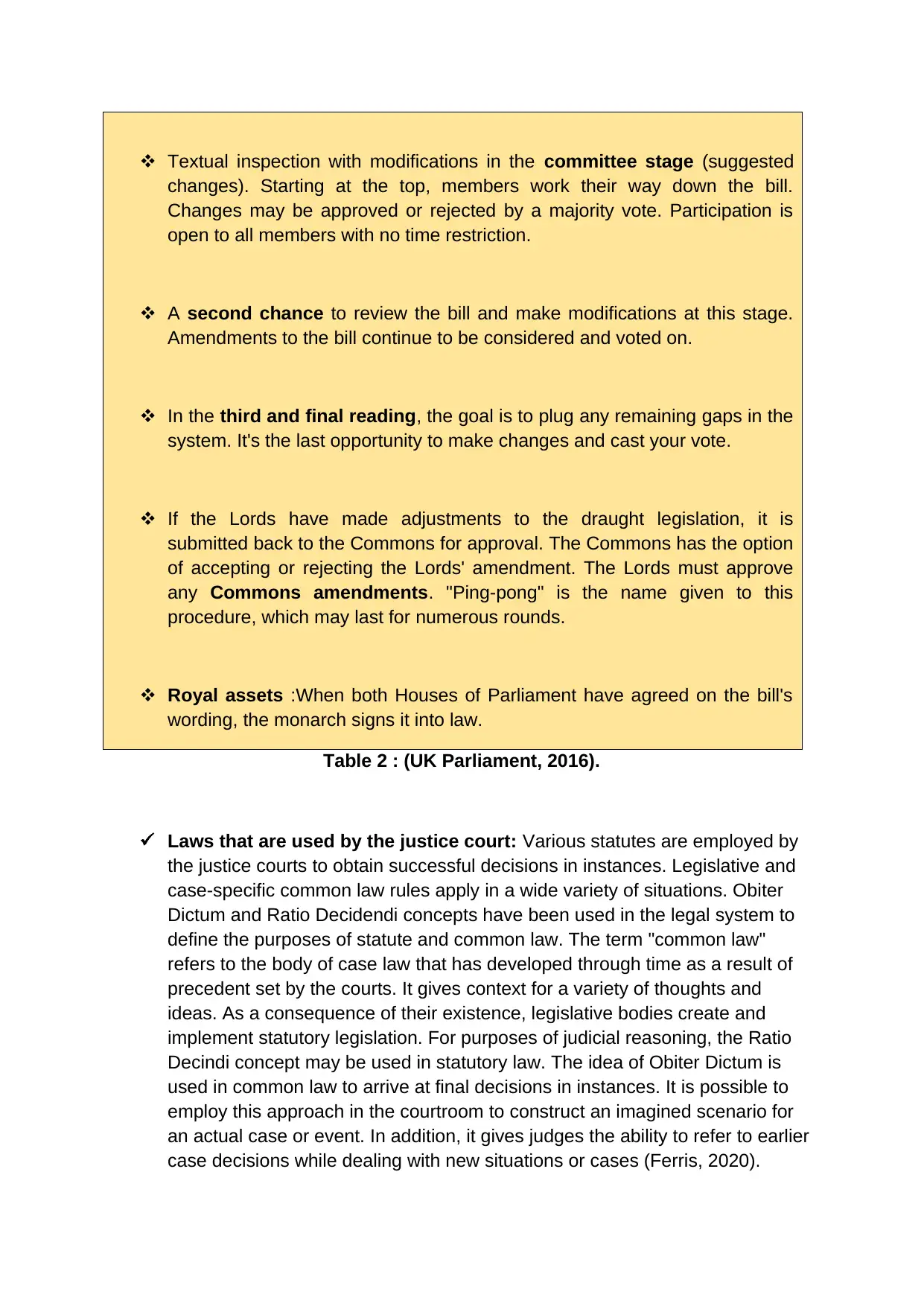
Textual inspection with modifications in the committee stage (suggested
changes). Starting at the top, members work their way down the bill.
Changes may be approved or rejected by a majority vote. Participation is
open to all members with no time restriction.
A second chance to review the bill and make modifications at this stage.
Amendments to the bill continue to be considered and voted on.
In the third and final reading, the goal is to plug any remaining gaps in the
system. It's the last opportunity to make changes and cast your vote.
If the Lords have made adjustments to the draught legislation, it is
submitted back to the Commons for approval. The Commons has the option
of accepting or rejecting the Lords' amendment. The Lords must approve
any Commons amendments. "Ping-pong" is the name given to this
procedure, which may last for numerous rounds.
Royal assets :When both Houses of Parliament have agreed on the bill's
wording, the monarch signs it into law.
Table 2 : (UK Parliament, 2016).
Laws that are used by the justice court: Various statutes are employed by
the justice courts to obtain successful decisions in instances. Legislative and
case-specific common law rules apply in a wide variety of situations. Obiter
Dictum and Ratio Decidendi concepts have been used in the legal system to
define the purposes of statute and common law. The term "common law"
refers to the body of case law that has developed through time as a result of
precedent set by the courts. It gives context for a variety of thoughts and
ideas. As a consequence of their existence, legislative bodies create and
implement statutory legislation. For purposes of judicial reasoning, the Ratio
Decindi concept may be used in statutory law. The idea of Obiter Dictum is
used in common law to arrive at final decisions in instances. It is possible to
employ this approach in the courtroom to construct an imagined scenario for
an actual case or event. In addition, it gives judges the ability to refer to earlier
case decisions while dealing with new situations or cases (Ferris, 2020).
changes). Starting at the top, members work their way down the bill.
Changes may be approved or rejected by a majority vote. Participation is
open to all members with no time restriction.
A second chance to review the bill and make modifications at this stage.
Amendments to the bill continue to be considered and voted on.
In the third and final reading, the goal is to plug any remaining gaps in the
system. It's the last opportunity to make changes and cast your vote.
If the Lords have made adjustments to the draught legislation, it is
submitted back to the Commons for approval. The Commons has the option
of accepting or rejecting the Lords' amendment. The Lords must approve
any Commons amendments. "Ping-pong" is the name given to this
procedure, which may last for numerous rounds.
Royal assets :When both Houses of Parliament have agreed on the bill's
wording, the monarch signs it into law.
Table 2 : (UK Parliament, 2016).
Laws that are used by the justice court: Various statutes are employed by
the justice courts to obtain successful decisions in instances. Legislative and
case-specific common law rules apply in a wide variety of situations. Obiter
Dictum and Ratio Decidendi concepts have been used in the legal system to
define the purposes of statute and common law. The term "common law"
refers to the body of case law that has developed through time as a result of
precedent set by the courts. It gives context for a variety of thoughts and
ideas. As a consequence of their existence, legislative bodies create and
implement statutory legislation. For purposes of judicial reasoning, the Ratio
Decindi concept may be used in statutory law. The idea of Obiter Dictum is
used in common law to arrive at final decisions in instances. It is possible to
employ this approach in the courtroom to construct an imagined scenario for
an actual case or event. In addition, it gives judges the ability to refer to earlier
case decisions while dealing with new situations or cases (Ferris, 2020).
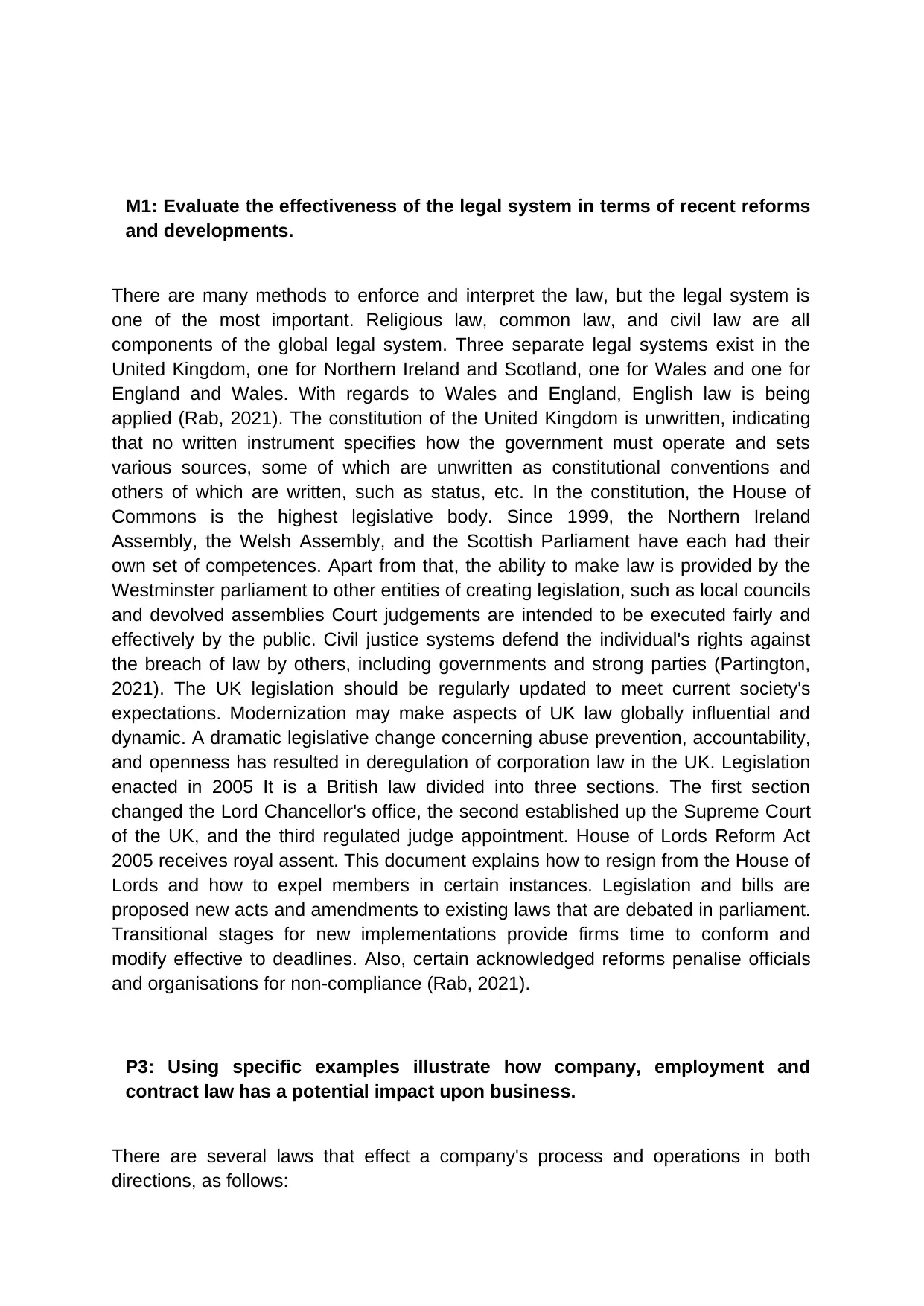
M1: Evaluate the effectiveness of the legal system in terms of recent reforms
and developments.
There are many methods to enforce and interpret the law, but the legal system is
one of the most important. Religious law, common law, and civil law are all
components of the global legal system. Three separate legal systems exist in the
United Kingdom, one for Northern Ireland and Scotland, one for Wales and one for
England and Wales. With regards to Wales and England, English law is being
applied (Rab, 2021). The constitution of the United Kingdom is unwritten, indicating
that no written instrument specifies how the government must operate and sets
various sources, some of which are unwritten as constitutional conventions and
others of which are written, such as status, etc. In the constitution, the House of
Commons is the highest legislative body. Since 1999, the Northern Ireland
Assembly, the Welsh Assembly, and the Scottish Parliament have each had their
own set of competences. Apart from that, the ability to make law is provided by the
Westminster parliament to other entities of creating legislation, such as local councils
and devolved assemblies Court judgements are intended to be executed fairly and
effectively by the public. Civil justice systems defend the individual's rights against
the breach of law by others, including governments and strong parties (Partington,
2021). The UK legislation should be regularly updated to meet current society's
expectations. Modernization may make aspects of UK law globally influential and
dynamic. A dramatic legislative change concerning abuse prevention, accountability,
and openness has resulted in deregulation of corporation law in the UK. Legislation
enacted in 2005 It is a British law divided into three sections. The first section
changed the Lord Chancellor's office, the second established up the Supreme Court
of the UK, and the third regulated judge appointment. House of Lords Reform Act
2005 receives royal assent. This document explains how to resign from the House of
Lords and how to expel members in certain instances. Legislation and bills are
proposed new acts and amendments to existing laws that are debated in parliament.
Transitional stages for new implementations provide firms time to conform and
modify effective to deadlines. Also, certain acknowledged reforms penalise officials
and organisations for non-compliance (Rab, 2021).
P3: Using specific examples illustrate how company, employment and
contract law has a potential impact upon business.
There are several laws that effect a company's process and operations in both
directions, as follows:
and developments.
There are many methods to enforce and interpret the law, but the legal system is
one of the most important. Religious law, common law, and civil law are all
components of the global legal system. Three separate legal systems exist in the
United Kingdom, one for Northern Ireland and Scotland, one for Wales and one for
England and Wales. With regards to Wales and England, English law is being
applied (Rab, 2021). The constitution of the United Kingdom is unwritten, indicating
that no written instrument specifies how the government must operate and sets
various sources, some of which are unwritten as constitutional conventions and
others of which are written, such as status, etc. In the constitution, the House of
Commons is the highest legislative body. Since 1999, the Northern Ireland
Assembly, the Welsh Assembly, and the Scottish Parliament have each had their
own set of competences. Apart from that, the ability to make law is provided by the
Westminster parliament to other entities of creating legislation, such as local councils
and devolved assemblies Court judgements are intended to be executed fairly and
effectively by the public. Civil justice systems defend the individual's rights against
the breach of law by others, including governments and strong parties (Partington,
2021). The UK legislation should be regularly updated to meet current society's
expectations. Modernization may make aspects of UK law globally influential and
dynamic. A dramatic legislative change concerning abuse prevention, accountability,
and openness has resulted in deregulation of corporation law in the UK. Legislation
enacted in 2005 It is a British law divided into three sections. The first section
changed the Lord Chancellor's office, the second established up the Supreme Court
of the UK, and the third regulated judge appointment. House of Lords Reform Act
2005 receives royal assent. This document explains how to resign from the House of
Lords and how to expel members in certain instances. Legislation and bills are
proposed new acts and amendments to existing laws that are debated in parliament.
Transitional stages for new implementations provide firms time to conform and
modify effective to deadlines. Also, certain acknowledged reforms penalise officials
and organisations for non-compliance (Rab, 2021).
P3: Using specific examples illustrate how company, employment and
contract law has a potential impact upon business.
There are several laws that effect a company's process and operations in both
directions, as follows:
⊘ This is a preview!⊘
Do you want full access?
Subscribe today to unlock all pages.

Trusted by 1+ million students worldwide
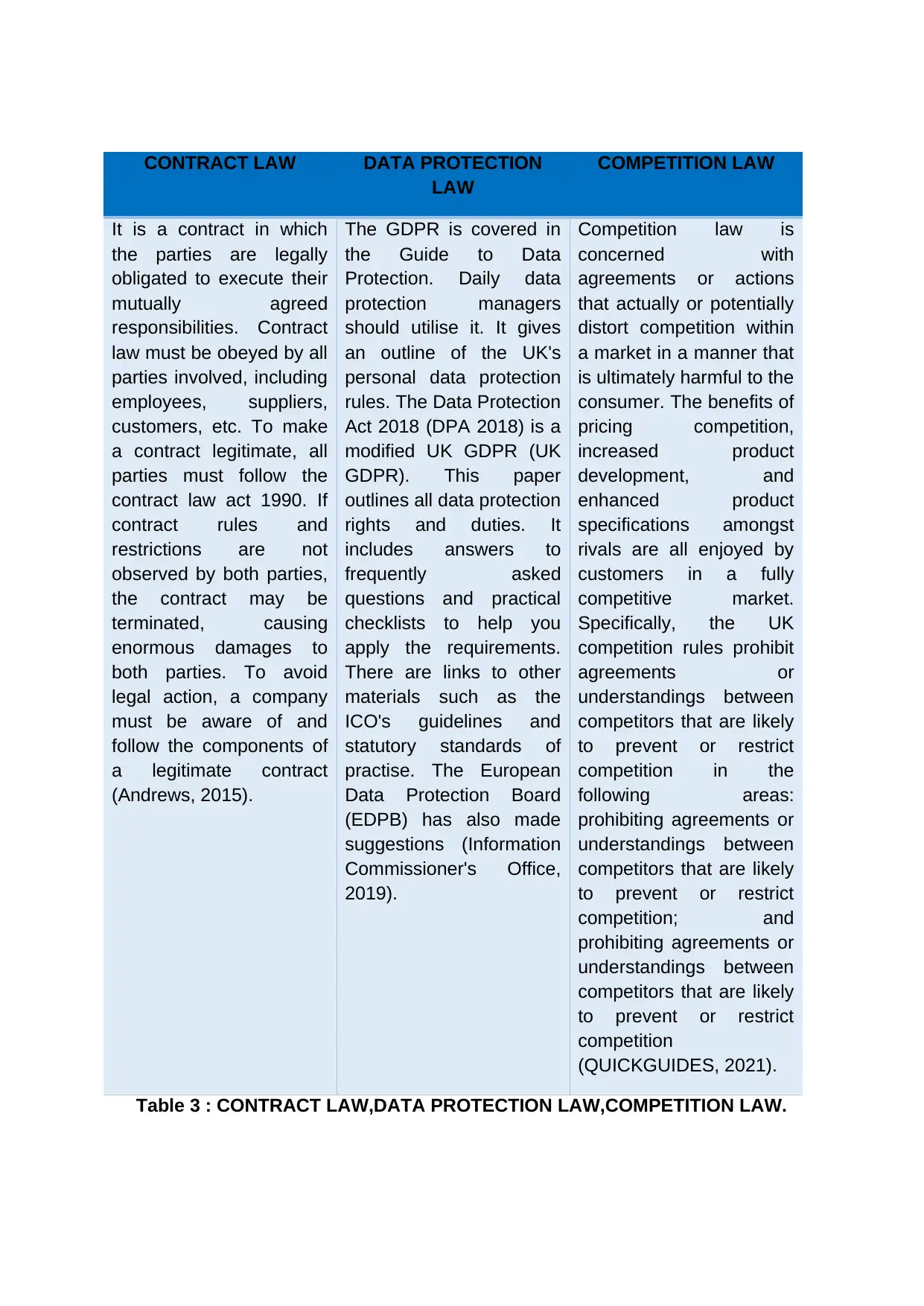
CONTRACT LAW DATA PROTECTION
LAW
COMPETITION LAW
It is a contract in which
the parties are legally
obligated to execute their
mutually agreed
responsibilities. Contract
law must be obeyed by all
parties involved, including
employees, suppliers,
customers, etc. To make
a contract legitimate, all
parties must follow the
contract law act 1990. If
contract rules and
restrictions are not
observed by both parties,
the contract may be
terminated, causing
enormous damages to
both parties. To avoid
legal action, a company
must be aware of and
follow the components of
a legitimate contract
(Andrews, 2015).
The GDPR is covered in
the Guide to Data
Protection. Daily data
protection managers
should utilise it. It gives
an outline of the UK's
personal data protection
rules. The Data Protection
Act 2018 (DPA 2018) is a
modified UK GDPR (UK
GDPR). This paper
outlines all data protection
rights and duties. It
includes answers to
frequently asked
questions and practical
checklists to help you
apply the requirements.
There are links to other
materials such as the
ICO's guidelines and
statutory standards of
practise. The European
Data Protection Board
(EDPB) has also made
suggestions (Information
Commissioner's Office,
2019).
Competition law is
concerned with
agreements or actions
that actually or potentially
distort competition within
a market in a manner that
is ultimately harmful to the
consumer. The benefits of
pricing competition,
increased product
development, and
enhanced product
specifications amongst
rivals are all enjoyed by
customers in a fully
competitive market.
Specifically, the UK
competition rules prohibit
agreements or
understandings between
competitors that are likely
to prevent or restrict
competition in the
following areas:
prohibiting agreements or
understandings between
competitors that are likely
to prevent or restrict
competition; and
prohibiting agreements or
understandings between
competitors that are likely
to prevent or restrict
competition
(QUICKGUIDES, 2021).
Table 3 : CONTRACT LAW,DATA PROTECTION LAW,COMPETITION LAW.
LAW
COMPETITION LAW
It is a contract in which
the parties are legally
obligated to execute their
mutually agreed
responsibilities. Contract
law must be obeyed by all
parties involved, including
employees, suppliers,
customers, etc. To make
a contract legitimate, all
parties must follow the
contract law act 1990. If
contract rules and
restrictions are not
observed by both parties,
the contract may be
terminated, causing
enormous damages to
both parties. To avoid
legal action, a company
must be aware of and
follow the components of
a legitimate contract
(Andrews, 2015).
The GDPR is covered in
the Guide to Data
Protection. Daily data
protection managers
should utilise it. It gives
an outline of the UK's
personal data protection
rules. The Data Protection
Act 2018 (DPA 2018) is a
modified UK GDPR (UK
GDPR). This paper
outlines all data protection
rights and duties. It
includes answers to
frequently asked
questions and practical
checklists to help you
apply the requirements.
There are links to other
materials such as the
ICO's guidelines and
statutory standards of
practise. The European
Data Protection Board
(EDPB) has also made
suggestions (Information
Commissioner's Office,
2019).
Competition law is
concerned with
agreements or actions
that actually or potentially
distort competition within
a market in a manner that
is ultimately harmful to the
consumer. The benefits of
pricing competition,
increased product
development, and
enhanced product
specifications amongst
rivals are all enjoyed by
customers in a fully
competitive market.
Specifically, the UK
competition rules prohibit
agreements or
understandings between
competitors that are likely
to prevent or restrict
competition in the
following areas:
prohibiting agreements or
understandings between
competitors that are likely
to prevent or restrict
competition; and
prohibiting agreements or
understandings between
competitors that are likely
to prevent or restrict
competition
(QUICKGUIDES, 2021).
Table 3 : CONTRACT LAW,DATA PROTECTION LAW,COMPETITION LAW.
Paraphrase This Document
Need a fresh take? Get an instant paraphrase of this document with our AI Paraphraser
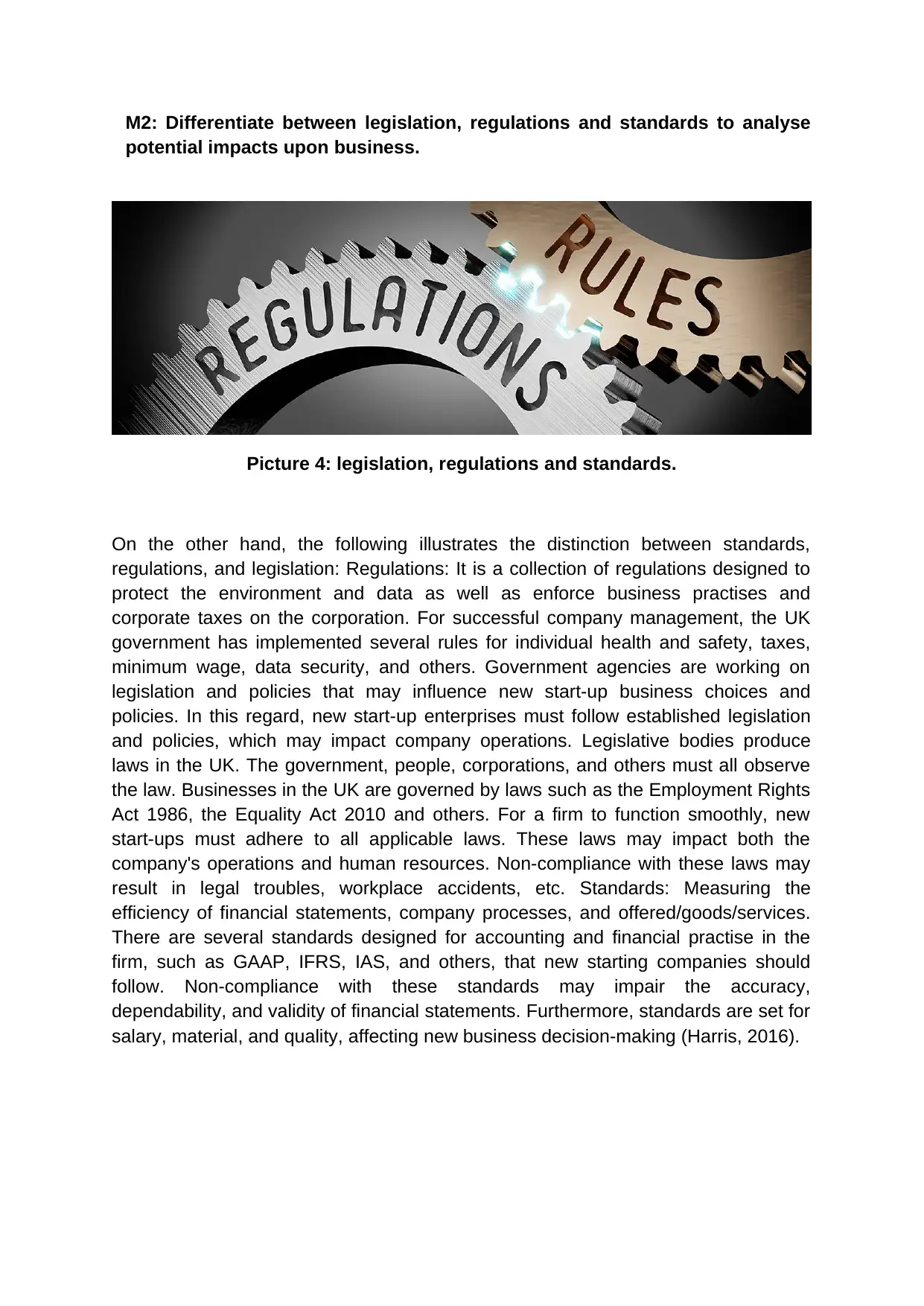
M2: Differentiate between legislation, regulations and standards to analyse
potential impacts upon business.
Picture 4: legislation, regulations and standards.
On the other hand, the following illustrates the distinction between standards,
regulations, and legislation: Regulations: It is a collection of regulations designed to
protect the environment and data as well as enforce business practises and
corporate taxes on the corporation. For successful company management, the UK
government has implemented several rules for individual health and safety, taxes,
minimum wage, data security, and others. Government agencies are working on
legislation and policies that may influence new start-up business choices and
policies. In this regard, new start-up enterprises must follow established legislation
and policies, which may impact company operations. Legislative bodies produce
laws in the UK. The government, people, corporations, and others must all observe
the law. Businesses in the UK are governed by laws such as the Employment Rights
Act 1986, the Equality Act 2010 and others. For a firm to function smoothly, new
start-ups must adhere to all applicable laws. These laws may impact both the
company's operations and human resources. Non-compliance with these laws may
result in legal troubles, workplace accidents, etc. Standards: Measuring the
efficiency of financial statements, company processes, and offered/goods/services.
There are several standards designed for accounting and financial practise in the
firm, such as GAAP, IFRS, IAS, and others, that new starting companies should
follow. Non-compliance with these standards may impair the accuracy,
dependability, and validity of financial statements. Furthermore, standards are set for
salary, material, and quality, affecting new business decision-making (Harris, 2016).
potential impacts upon business.
Picture 4: legislation, regulations and standards.
On the other hand, the following illustrates the distinction between standards,
regulations, and legislation: Regulations: It is a collection of regulations designed to
protect the environment and data as well as enforce business practises and
corporate taxes on the corporation. For successful company management, the UK
government has implemented several rules for individual health and safety, taxes,
minimum wage, data security, and others. Government agencies are working on
legislation and policies that may influence new start-up business choices and
policies. In this regard, new start-up enterprises must follow established legislation
and policies, which may impact company operations. Legislative bodies produce
laws in the UK. The government, people, corporations, and others must all observe
the law. Businesses in the UK are governed by laws such as the Employment Rights
Act 1986, the Equality Act 2010 and others. For a firm to function smoothly, new
start-ups must adhere to all applicable laws. These laws may impact both the
company's operations and human resources. Non-compliance with these laws may
result in legal troubles, workplace accidents, etc. Standards: Measuring the
efficiency of financial statements, company processes, and offered/goods/services.
There are several standards designed for accounting and financial practise in the
firm, such as GAAP, IFRS, IAS, and others, that new starting companies should
follow. Non-compliance with these standards may impair the accuracy,
dependability, and validity of financial statements. Furthermore, standards are set for
salary, material, and quality, affecting new business decision-making (Harris, 2016).
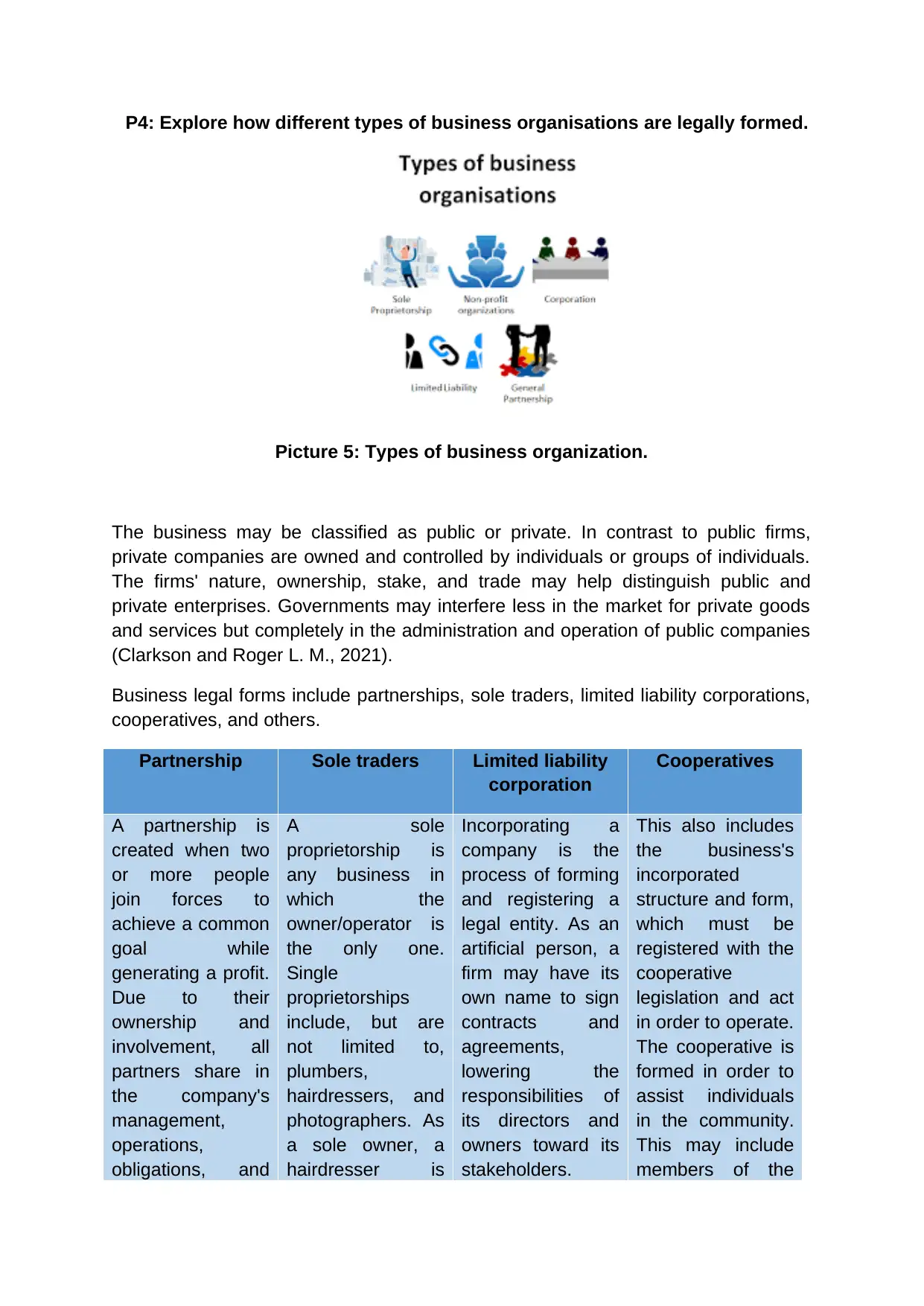
P4: Explore how different types of business organisations are legally formed.
Picture 5: Types of business organization.
The business may be classified as public or private. In contrast to public firms,
private companies are owned and controlled by individuals or groups of individuals.
The firms' nature, ownership, stake, and trade may help distinguish public and
private enterprises. Governments may interfere less in the market for private goods
and services but completely in the administration and operation of public companies
(Clarkson and Roger L. M., 2021).
Business legal forms include partnerships, sole traders, limited liability corporations,
cooperatives, and others.
Partnership Sole traders Limited liability
corporation
Cooperatives
A partnership is
created when two
or more people
join forces to
achieve a common
goal while
generating a profit.
Due to their
ownership and
involvement, all
partners share in
the company's
management,
operations,
obligations, and
A sole
proprietorship is
any business in
which the
owner/operator is
the only one.
Single
proprietorships
include, but are
not limited to,
plumbers,
hairdressers, and
photographers. As
a sole owner, a
hairdresser is
Incorporating a
company is the
process of forming
and registering a
legal entity. As an
artificial person, a
firm may have its
own name to sign
contracts and
agreements,
lowering the
responsibilities of
its directors and
owners toward its
stakeholders.
This also includes
the business's
incorporated
structure and form,
which must be
registered with the
cooperative
legislation and act
in order to operate.
The cooperative is
formed in order to
assist individuals
in the community.
This may include
members of the
Picture 5: Types of business organization.
The business may be classified as public or private. In contrast to public firms,
private companies are owned and controlled by individuals or groups of individuals.
The firms' nature, ownership, stake, and trade may help distinguish public and
private enterprises. Governments may interfere less in the market for private goods
and services but completely in the administration and operation of public companies
(Clarkson and Roger L. M., 2021).
Business legal forms include partnerships, sole traders, limited liability corporations,
cooperatives, and others.
Partnership Sole traders Limited liability
corporation
Cooperatives
A partnership is
created when two
or more people
join forces to
achieve a common
goal while
generating a profit.
Due to their
ownership and
involvement, all
partners share in
the company's
management,
operations,
obligations, and
A sole
proprietorship is
any business in
which the
owner/operator is
the only one.
Single
proprietorships
include, but are
not limited to,
plumbers,
hairdressers, and
photographers. As
a sole owner, a
hairdresser is
Incorporating a
company is the
process of forming
and registering a
legal entity. As an
artificial person, a
firm may have its
own name to sign
contracts and
agreements,
lowering the
responsibilities of
its directors and
owners toward its
stakeholders.
This also includes
the business's
incorporated
structure and form,
which must be
registered with the
cooperative
legislation and act
in order to operate.
The cooperative is
formed in order to
assist individuals
in the community.
This may include
members of the
⊘ This is a preview!⊘
Do you want full access?
Subscribe today to unlock all pages.

Trusted by 1+ million students worldwide
1 out of 21
Related Documents
Your All-in-One AI-Powered Toolkit for Academic Success.
+13062052269
info@desklib.com
Available 24*7 on WhatsApp / Email
![[object Object]](/_next/static/media/star-bottom.7253800d.svg)
Unlock your academic potential
Copyright © 2020–2025 A2Z Services. All Rights Reserved. Developed and managed by ZUCOL.




